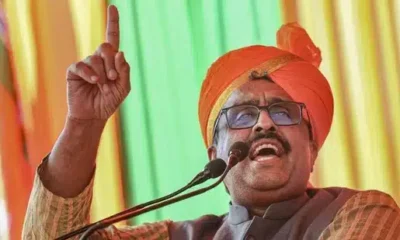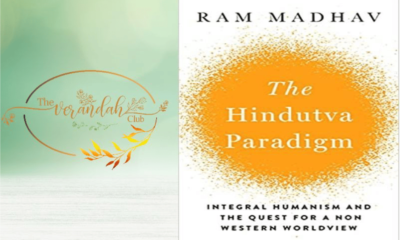Global Order: Your book seems to have arrived at an opportune moment when discussions about non-Western perspectives seems to be growing. Would you say that Deen Dayal Upadhyay (and Gandhi, who you refer to) are the definitive Indian critiques of the West?
Ram Madhav: I consider this book as seven decades late. That there was a need for a non-Western perspective to India’s and world’s progress was felt by all the important leaders at the time of our independence itself. Rishi Aurobindo had talked about it categorically in his address to the nation on 15 August 1947 from the Tiruchinapalli radio station. He insisted that India’s freedom was not for her own sake, but for the sake of entire humanity. Gandhi had talked about it all through until his demise.
Even Jawaharlal Nehru, despite the fact that he was a great admirer of many aspects of the West like socialistic ideas and scientific temper, was candid that Europeans shouldn’t think that they had answers for all the ills of the world. In his first ever address to the United Nations at Paris in 1949, Nehru was candid. “May I say, as a representative from Asia, that we honour Europe for its culture and for great advance in human civilisation which it represents! But may I also say that the world is something bigger than Europe, and you will not solve your problems by thinking that the problems of the world are mainly European problems. Today, I do venture to submit that Asia counts in world affairs. Tomorrow, it will count much more than today”, he said.
Deen Dayal was one leader who had developed a complete thesis in the form of Integral Humanism in 1960s highlighting the non-Western worldview of India. But sadly, even he did not get enough time to take the idea forward. Today, as the world is entering into a new order, it is time we revisited some of those quintessentially Indian ideas to guide and shape the future of the mankind. This book is one effort in that direction, but should not be the only one. Many more should come from many others. Its time has certainly come.
Global Order: One of the most relevant points Deen Dayal Upadhyay makes is the limitations of ‘survival of the fittest’, this idea echoes in all kinds of contemporary debates from the rights of refugees to universal basic income. Why do you think that this idea has not been better championed by the Indian state in its policies or even Indian society?
Ram Madhav: ‘Survival of the fittest’ was a proposition of the 19th century British naturalist Charles Darwin. He theorised that there was bound to be a ‘struggle for existence’ in the living organisms and those that adjust to the environment would only succeed in surviving. This Darwinian proposition became the basis for many an economic, political and social theory in the last two centuries in the West.
But the Eastern wisdom has never seen conflict in creation. Where it existed, it was seen as a result of ‘Maya’ or ‘illusion’. Fundamental unity and harmony as the basis of the universe is the essence of the Indic wisdom. We should have developed all our social, political and economic models based on that concept. For example, our political model should have been not ‘majoritarian’ but ‘consensual’ democracy. Gandhi called it Ram Rajya. Deen Dayal insisted on it. Similarly, our economic model should have been based on ‘Sarvodya’ – ‘welfare of all’ of Gandhi or ‘Antyodaya’ – ‘welfare of the last’ of Deen Dayal.
Instead of taking a cue from this Indian idea, Nehru-Mahalanobis duo went about aping the European quasi-Socialist economics in India in the initial years of independence. When food shortages and foreign exchange crisis hit the country by the end of 1950s, Nehru had realised that the model was not working. But the effort to get rid of it had not resulted in turning to Indian wisdom. Rather, we went to the other extreme in early 1990s when Socialism was discarded in favour of Market Liberalism.
The result is, while macroeconomic indicators have presented a promising picture, micro level challenges of grassroots inequality, uneven growth and underemployment continue to plague our system. The present government is making efforts to address some of these challenges through its emphasis on ‘Atmanirbhar Bharat’ – ‘self-reliant India’.
Global Order: How does Deen Dayal Updhyay’s ideas about society having its own ‘soul’ or having a kind of common consciousness translate into a world where global warming might disrupt nation states in ways where the idea of citizenship itself might become more diluted or fraught with anxiety?
Ram Madhav: That different nations have their own national character is a largely accepted proposition in the world today among the scholars. No two nations respond to a situation in a similar manner. In their fascinating book ‘Culture Matters: How Values Shape Human Progress’, Harvard scholars Samuel Huntington and Lawrence Harrison highlight this aspect forcefully with multiple national examples. National identities are shaped by their distinct behavioural patterns. Deen Dayal had proposed that these behavioural patterns are a product of a soul force that each nation develops through its living experience of centuries.
There have always been efforts to erase these national identities. Religions and socio-political ideologies were seen as a means of creating uniformity in the world. A global identity based on a uniform global order continues to guide the attitudes and activities of some, like the Liberal ideologues and corporate tech giants, who find vested interest in it for their own. Global citizen is a euphemism for them. There was once the dream of ‘Pax Romana’ – world in the image of Rome. There were some, like Charles Krauthammer, who believed in ‘Pax Americana’.
Indic wisdom, as enunciated by Deen Dayal and others, was not against global unity in facing challenges like climate change. But it is against efforts to create ‘uniformity’. Unity in form is against nature; unity in spirit is the essence of creation. Diversity is order, not aberration.
At the same time, national identities should not become impediments in achieving global unity. Rishi Aurobindo, in his famous Independence Day address, talked about his five dreams in which he said that India’s freedom should lead to Asian renaissance, global unity, spiritualisation of humanity and finally the elevation of this universe into a higher plane. He talked not about creating just a ‘global citizen’ out of the humans but a ‘superman’ – an elevated and enlightened citizen.
Global Order: Could ‘dharma’ be developed into a governing principle or idea of governance?
Ram Madhav: Dharma is essentially a set of universal ideals, a product of the worldview evolved in India through millennia of intellectual churning and experience. The Dharmic ideals should become the basis for building all institutions – including social and political institutions like governance.
Dharma-based political system that can be called ‘Dharmocracy’ is certainly possible. But for that to happen, we should be prepared to discard some of the existing institutions and models. It calls for courage and perseverance of the leadership. It took half a century for Marx’s ideals of Communism to be translated into action. A leader of Lenin’s stature was needed for that to happen. It took a couple of centuries and steadfast efforts by Abraham Lincoln, George Washington and Martin Luther King Jr for America to establish unity and liberal democratic political order.
Dharma-based socio-political order too requires similar commitment and determination.
Global Order: How accurate is the Hindutva/Hinduism debate?
Ram Madhav: Hindutva was a word coined by Savarkar. It essentially meant ‘Hinduism in action’. Trying to differentiate between the two words – Hindutva and Hinduism – is nothing but political expediency.
‘Ism’s are closed set of ideas. Many proponents of Hindutva insist that Hindu philosophy cannot be called an ‘ism’ because it is an open and inclusive philosophy. Gandhi described it as the quest for eternal truth. The nearest English translation for Hindutva could be Hindu-ness or Hindu-dom.
Those who try to differentiate between Hindutva and Hinduism do not know for sure about the essence of Hindutva, but they are blissfully unaware of Hinduism too. Hindu, Hindutva, Bharatiya, Sanatan and Indian – all these words represent same essence and meaning.
~
(The Hindutva Paradigm is out now from Westland publishers.)




